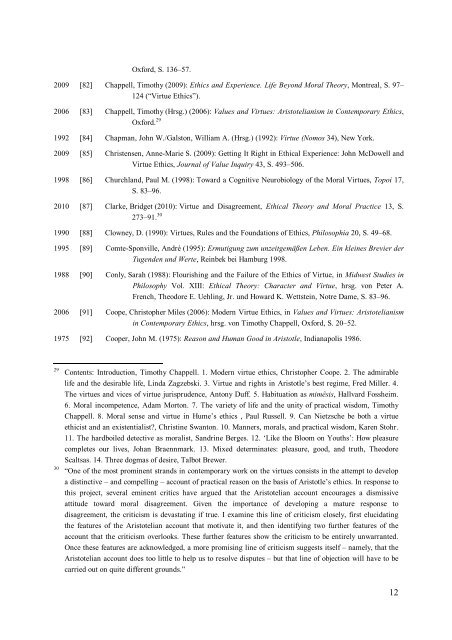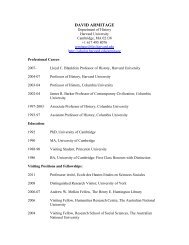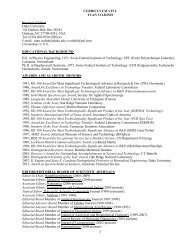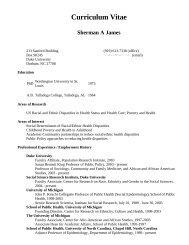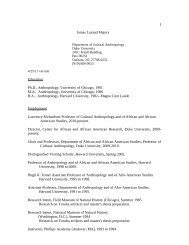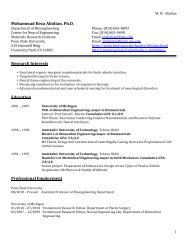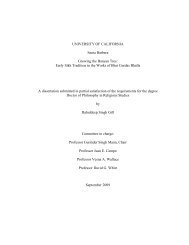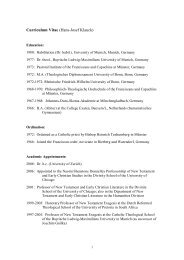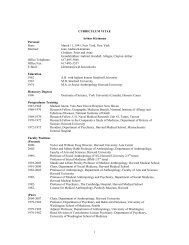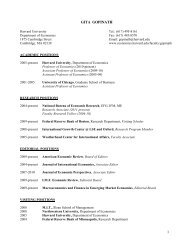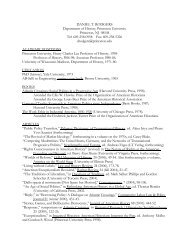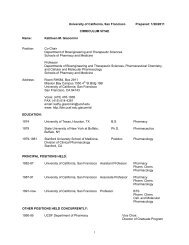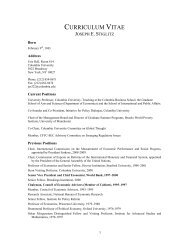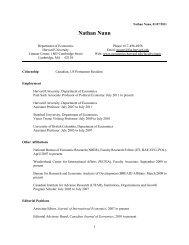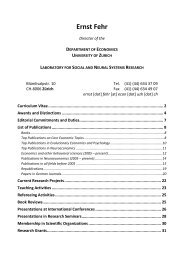Oxford, S. 136–57.2009 [82] Chappell, Timothy (2009): Ethics and Experience. Life Bey<strong>on</strong>d Moral Theory, M<strong>on</strong>treal, S. 97–124 (“<strong>Virtue</strong> Ethics”).2006 [83] Chappell, Timothy (Hrsg.) (2006): Values and <strong>Virtue</strong>s: Aristotelianism in C<strong>on</strong>temporary Ethics,Oxford. 291992 [84] Chapman, John W./Galst<strong>on</strong>, William A. (Hrsg.) (1992): <strong>Virtue</strong> (Nomos 34), New York.2009 [85] Christensen, Anne-Marie S. (2009): Getting It Right in Ethical Experience: John McDowell and<strong>Virtue</strong> Ethics, Journal of Value Inquiry 43, S. 493–506.1998 [86] Churchland, Paul M. (1998): Toward a Cognitive Neurobiology of the Moral <strong>Virtue</strong>s, Topoi 17,S. 83–96.2010 [87] Clarke, Bridget (2010): <strong>Virtue</strong> and Disagreement, Ethical Theory and Moral Practice 13, S.273–91. 301990 [88] Clowney, D. (1990): <strong>Virtue</strong>s, Rules and the Foundati<strong>on</strong>s of Ethics, Philosophia 20, S. 49–68.1995 [89] Comte-Sp<strong>on</strong>ville, André (1995): Ermutigung zum unzeitgemäßen Leben. Ein kleines Brevier derTugenden und Werte, Reinbek bei Hamburg 1998.1988 [90] C<strong>on</strong>ly, Sarah (1988): Flourishing and the Failure of the Ethics of <strong>Virtue</strong>, in Midwest Studies inPhilosophy Vol. XIII: Ethical Theory: Character and <strong>Virtue</strong>, hrsg. v<strong>on</strong> Peter A.French, Theodore E. Uehling, Jr. und Howard K. Wettstein, Notre Dame, S. 83–96.2006 [91] Coope, Christopher Miles (2006): Modern <strong>Virtue</strong> Ethics, in Values and <strong>Virtue</strong>s: Aristotelianismin C<strong>on</strong>temporary Ethics, hrsg. v<strong>on</strong> Timothy Chappell, Oxford, S. 20–52.1975 [92] Cooper, John M. (1975): Reas<strong>on</strong> and Human Good in Aristotle, Indianapolis 1986.2930C<strong>on</strong>tents: Introducti<strong>on</strong>, Timothy Chappell. 1. Modern virtue ethics, Christopher Coope. 2. The admirablelife and the desirable life, Linda Zagzebski. 3. <strong>Virtue</strong> and rights in Aristotle’s best regime, Fred Miller. 4.The virtues and vices of virtue jurisprudence, Ant<strong>on</strong>y Duff. 5. Habituati<strong>on</strong> as mimêsis, Hallvard Fossheim.6. Moral incompetence, Adam Mort<strong>on</strong>. 7. The variety of life and the unity of practical wisdom, TimothyChappell. 8. Moral sense and virtue in Hume’s ethics , Paul Russell. 9. Can Nietzsche be both a virtueethicist and an existentialist?, Christine Swant<strong>on</strong>. 10. Manners, morals, and practical wisdom, Karen Stohr.11. The hardboiled detective as moralist, Sandrine Berges. 12. ‘Like the Bloom <strong>on</strong> Youths’: How pleasurecompletes our lives, Johan Braennmark. 13. Mixed determinates: pleasure, good, and truth, TheodoreScaltsas. 14. Three dogmas of desire, Talbot Brewer.“One of the most prominent strands in c<strong>on</strong>temporary work <strong>on</strong> the virtues c<strong>on</strong>sists in the attempt to developa distinctive – and compelling – account of practical reas<strong>on</strong> <strong>on</strong> the basis of Aristotle’s ethics. In resp<strong>on</strong>se tothis project, several eminent critics have argued that the Aristotelian account encourages a dismissiveattitude toward moral disagreement. Given the importance of developing a mature resp<strong>on</strong>se todisagreement, the criticism is devastating if true. I examine this line of criticism closely, first elucidatingthe features of the Aristotelian account that motivate it, and then identifying two further features of theaccount that the criticism overlooks. These further features show the criticism to be entirely unwarranted.Once these features are acknowledged, a more promising line of criticism suggests itself – namely, that theAristotelian account does too little to help us to resolve disputes – but that line of objecti<strong>on</strong> will have to becarried out <strong>on</strong> quite different grounds.”12
1998 [93] Cooper, John M. (1998): The Unity of <strong>Virtue</strong>, in <strong>Virtue</strong> and Vice, hrsg. v<strong>on</strong> Ellen Frankel Paul,Fred D. Miller, Jr. und Jeffrey Paul, Cambridge, S. 233–74.2010 [94] Coplan, Amy (2010): Feeling Without Thinking: Less<strong>on</strong>s from the Ancients <strong>on</strong> Emoti<strong>on</strong> and<strong>Virtue</strong>-Acquisiti<strong>on</strong>, Metaphilosophy 41, S. 132–51. 311994 [95] Cordner, Christopher (1994): Aristotelian <strong>Virtue</strong> and its Limitati<strong>on</strong>s, Philosophy 69, 291–316.1991 [96] Cottingham, John (1991): The Ethics of Self-C<strong>on</strong>cern, Ethics 101, S. 798–817.1996 [97] Cottingham, John (1996): Partiality and the <strong>Virtue</strong>s, in How Should One Live? Essays <strong>on</strong> the<strong>Virtue</strong>s, hrsg. v<strong>on</strong> Roger Crisp, Oxford, S. 57–76.2006 [98] Cox, Damian (2006): Agent-based Theories of Right Acti<strong>on</strong>, Ethical Theory and Moral Practice9, S. 505–15. 321992 [99] Crisp, Roger (1992): Utilitarianism and the Life of <strong>Virtue</strong>, Philosophical Quarterly 42, S. 139–60.1996 [100] Crisp, Roger (1996): Modern Moral Philosophy and the <strong>Virtue</strong>s, in How Should One Live?Essays <strong>on</strong> the <strong>Virtue</strong>s, hrsg. v<strong>on</strong> Roger Crisp, Oxford, S. 1–18.1998 [101] Crisp, Roger (1998): <strong>Virtue</strong> Ethics, in Routledge Encyclopedia of Philosophy, hrsg. v<strong>on</strong> EdwardCraig, Vol. 9, L<strong>on</strong>d<strong>on</strong>, S. 622–26.2010 [102] Crisp, Roger (2010): <strong>Virtue</strong> Ethics and <strong>Virtue</strong> Epistemology, Metaphilosophy 41, S. 22–40. 331996 [103] Crisp, Roger (Hrsg.) (1996): How Should One Live? Essays <strong>on</strong> the <strong>Virtue</strong>s, Oxford.313233“By briefly sketching some important ancient accounts of the c<strong>on</strong>necti<strong>on</strong>s between psychology and moraleducati<strong>on</strong>, I hope to illuminate the significance of the c<strong>on</strong>temporary debate <strong>on</strong> the nature of emoti<strong>on</strong> and toreveal its stakes. I begin the essay with a brief discussi<strong>on</strong> of intellectualism in Socrates and the Stoics, andPlato’s and Posid<strong>on</strong>ius’s respective attacks against it. Next, I examine the two current leadingphilosophical accounts of emoti<strong>on</strong>: the cognitive theory and the n<strong>on</strong>cognitive theory. I maintain that then<strong>on</strong>cognitive theory better explains human behavior and experience and has more empirical support thanthe cognitive theory. In the third secti<strong>on</strong> of the essay I argue that recent empirical research <strong>on</strong> emoti<strong>on</strong>alc<strong>on</strong>tagi<strong>on</strong> and mirroring processes provides important new evidence for the n<strong>on</strong>cognitive theory. In thefinal secti<strong>on</strong>, I draw some preliminary c<strong>on</strong>clusi<strong>on</strong>s about moral educati<strong>on</strong> and the acquisiti<strong>on</strong> of virtue.”“In this paper, I develop an objecti<strong>on</strong> to agent-based accounts of right acti<strong>on</strong>. Agent-based accounts of rightacti<strong>on</strong> attempt to derive moral judgment of acti<strong>on</strong>s from judgment of the inner quality of virtuous agentsand virtuous agency. A moral theory ought to be something that moral agents can permissibly use in moraldeliberati<strong>on</strong>. I argue for a principle that captures this intuiti<strong>on</strong> and show that, for a broad range of otherdirectedvirtues and motives, agent-based accounts of right acti<strong>on</strong> fail to satisfy this principle.”“The aim of this essay is to test the claim that epistemologists – virtue epistemologists in particular – havemuch to learn from virtue ethics. The essay begins with an outline of virtue ethics itself. This secti<strong>on</strong>c<strong>on</strong>cludes that a pure form of virtue ethics is likely to be unattractive, so the virtue epistemologist shouldexamine the "impure" views of real philosophers. Aristotle is usually held up as the paradigm virtueethicist. His doctrine of the mean is described, and it is explained how that doctrine can provide aframework for an account of epistemic virtue. The c<strong>on</strong>clusi<strong>on</strong> of the essay is that a virtue epistemologybased <strong>on</strong> analogies with virtue ethics, though well worth developing and c<strong>on</strong>sidering, will face severalchallenges in fulfilling the significant promises that have been made <strong>on</strong> its behalf.”13
- Page 1: Literatur
- Page 4 and 5: national Journal of Management Revi
- Page 6: 53.2010 [39] Battaly, Heather (2010
- Page 9 and 10: 2005 [60] Brady, Michael S. (2005):
- Page 11: 2008 [72] Calhoun, Cheshire (2008):
- Page 15 and 16: 2005 [120] Doris, John M. (2005): R
- Page 17 and 18: 1978 [138] Foot, Philippa (1978): V
- Page 19 and 20: 1996 [166] Griffin, James (1996): V
- Page 21 and 22: 166-84.1996 [188] Hooker, Brad (199
- Page 23 and 24: Theory and Moral Practice 8, S. 387
- Page 25 and 26: Ethics, hrsg. von Patricia H. Werha
- Page 27 and 28: Deutsche Zeitschrift für Philosoph
- Page 29 and 30: 2009 [280] Miller, Christian (2009)
- Page 31 and 32: 2000 [299] Oderberg, David S. (2000
- Page 33 and 34: Moral Education 24, S. 175-184.1997
- Page 35 and 36: Southern Journal of Philosophy 14,
- Page 37 and 38: 1997 [379] Slote, Michael (1997): V
- Page 39 and 40: 2009 [401] Sreenivasan, Gopal (2009
- Page 41 and 42: 2010 [416] Stohr, Karen E. (2010):
- Page 43 and 44: 2008 [441] Tessman, Lisa (2008): Re
- Page 45 and 46: 2009 [457] van Zyl, Liezl (2009): A
- Page 47 and 48: 2006 [475] Webber, Jonathan (2006):
- Page 49 and 50: 2008 [484] White, Richard (2008): R


